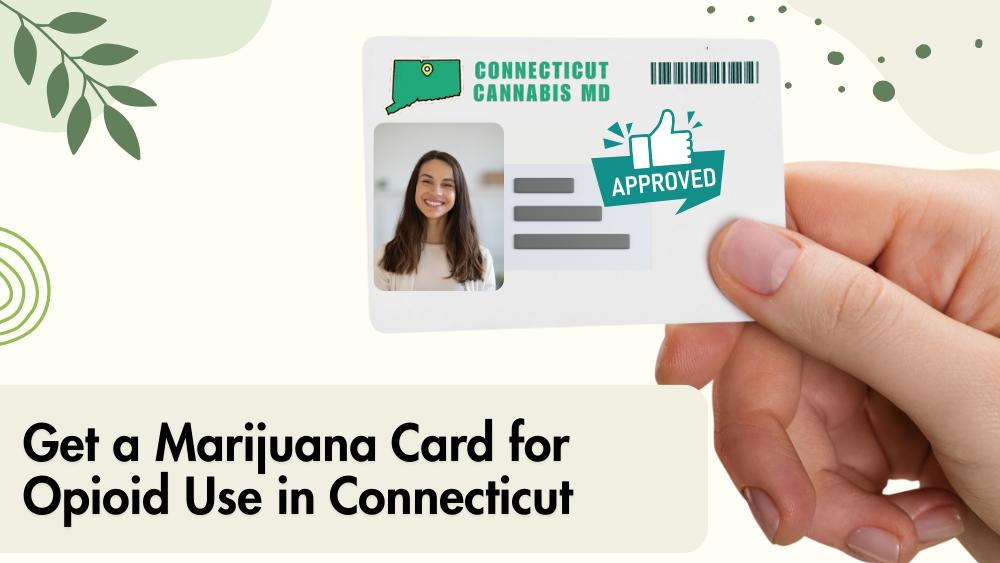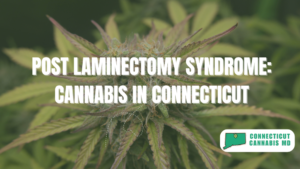Opioid crisis is still a major concern of the United States and Connecticut is also part of that problem. Opioid addiction continues to break families and communities and non-opioid treatment options are being explored in order to treat people caught in this deadly disease.
Cannabis as medicine has in recent times found its place as an effective pain relief remedy that curtails the use of opioids. Telemedicine has made it easier than ever to get a medical marijuana card for opioid use.
Patients in Connecticut can now seek advise from certified doctors online for their medical marijuana recommendations. First-time patients can pay $179, while those who come for a follow-up visit in a year can part with $149, thus, readily available and cost-friendly to the opioid addicted person, medical marijuana can provide a better treatment preference.
Here, the reader will learn how to attain a medical marijuana card in Connecticut, particularly for the use of opioids, and the advantages of the medicine.
What is Medical Marijuana and How Does It Help with Opioid Use?
Awareness on Medical Cannabis / Medical Marijuana
Medical marijuana means the use of marijuana for medical purposes such as in treatment of certain ailments. In Connecticut, marijuana has been legal for medical use with people with conditions like opioid use disorder eligible to be prescribed marijuana by registered healthcare practitioners.
Cannabis is made up of chemicals called cannabinoids including THC (Tetrahydrocannabinol), and Cannabidiol (CBD) — all of which connect with the body’s Endocannabinoid system.
Pain-modulating functions and other aspects sort out by this system, for example, mood regulation. It has been used to manage pain, to reduce inflammation and for treating symptoms like anxiety and nausea so it holds the potential for individuals suffering from opioid dependency.
Medical Marijuana as an Effective Adjunct to Opioids
To persons that are in the recovery process from opioid use disorder, then Medical use of marijuana is safer to use since it is able to manage pain that may result from injuries or illnesses without having to put the user at risk of suffering from dependency on opioids as it would do.
Opioids are very potent, and they are commonly used to control pain of long duration. But many a time these patients become hooked to these drugs and then they remain chained with withdrawal feelings.
Medical marijuana is a better and less dangerous substitute.
the uncomfortable signs of opioid withdrawal, for example; vomiting, muscle soreness and anxiety. These patients may be able to dispense with the use of opioids altogether or at least decrease the amounts that they currently consume.
Finally, this paper provides an overview of Connecticut’s medical marijuana laws governing opioid prescriptions.
Who qualifies for a Medical Marijuana Card in Connecticut
Before a patient can be approved a Connecticut medical marijuana card, the patient must be diagnosed with one of the qualifying conditions. Opioid use disorder is one of the qualifying conditions. After such a diagnosis, patients can get a marijuana recommendation from a certified healthcare provider legally dispensing medical marijuana.
Patients should realize the fact that the healthcare provider has to be permitted to recommend medical marijuana in Connecticut. This recommendation is now necessary for registering through the state’s medical marijuana program to obtain a medical marijuana card.
How to sign up for a Medical Marijuana Card Online
With the help of the telemedicine development, it is easier to submit your own application for medical marijuana in Connecticut now. It can be completed online, so the patient can speak with a certified healthcare provider online from the comfort of their home and fill out the application through the state’s website.
These are scheduling the appointment with a qualified medical marijuana recommender through a telemedicine visit, taking a medical examination, and then providing your application to the Connecticut Department of Consumer Protection (DCP). On approval of the application, patients will get their medical marijuana card that will enable them to access licensed stores.
Guideline of How to Obtain a Medical Marijuana Card for Opioid Use
Step 1: Get an Appointment for a Medical Marijuana Evaluation
The process of getting medical marijuana card for opioid use in Connecticut begins with setting up for an appointment with a certified medical marijuana provider. It is easy to make an appointment online and then get a medical evaluation without even having to leave your home through telemedicine.
During evaluation, the healthcare provider is obliged to administrate the patient a series of comprehensive assessment wherein the provider will be able to decide if the use of medical marijuana will work for your opioid use disorder. They will also describe how cannabis helps with pain resolve and avoiding withdrawal syndromes.
Step 2: To apply for any of the positions online, please complete the employment application below:
After getting your medical marijuana recommendation, the process of getting registered with the Connecticut Department of Consumer Protection (DCP) is by submitting an application online. To register for medical marijuana, you’ll submit your medical records, the marijuana recommendation, Identification documents, photos, and other documents as the physician as may deem fit to warrant you be issued with the recommendation.
Here is also an online portal that provides an application form and helps you give all the data to get the card approved. Online submission of your application is much easier and faster than applying through other methods that are being used today.
Step 3: Apply for the Card, Make the Application Fee and You Will Be Issued with the Card
There are charges to be paid in the process of getting a medical marijuana card in Connecticut. The marijuana recommendation through a telemedicine consultation for new patients costs $179, while those for follow-up in a year will cost $149. This fee is for consultation and a recommendation, and after your application has been approved you will get your medical marijuana card.
After being issued with the card, patients are allowed to buy medical marijuana products from licensed stores. Patients have a choice of how they would like to consume their marijuana depending with the products available in the dispensaries some of them being oils, edible products, and flowers.
Can one turn to Medical Marijuana for Opioid Use Disorder?
Responsible Use of Marijuana in the Treatment of Opiate Withdrawal Preferences
Some species of cannabis are more appropriate to manage cravings and the most common symptoms of withdrawal such as anxiety, muscle pain and nausea.
High-CBD strains, for instance, provide a cure for pain but does not cause the ‘high’ feeling you get when you use THC. At the same time, the strains that contain more THC can completely relax muscles and reduce loads on the psychological part of withdrawal.
Each patient should consult their doctor and find out which-strain and at what dosage is safe and effective for them to use.
Combining Pot for Other Methods
Yet when it comes to opioid use disorder medical marijuana has its place and is best used in conjunction with other medications. Psychotherapy, counseling and support groups are very effective in tackling the psychological and emotional part of addiction. The addition medical marijuana to the medication regimens allow patients to benefit from an all-round treatment plan.
How One Can Search for the Best Healthcare Professional for a Medical Marijuana Recommendation
The Advantages of Telemedicine for MMJ Certification
Telemedicine is particularly suitable for patients desiring medical marijuana recommendations and those who depend on opioids. Besides reaching healthcare providers, it also offers an opportunity for patients to get individualized treatment even without receiving a physical examination.
The following are some of the benefits that one can be able to get while using telemedicine: You can also be able to see certified health care providers from the comfort of your home hence enable you to get the access to the kind of care that one needs.
Furthermore, consultations through telemedicine can cost less: starting at $179 for recommendations at a new client and $149 for the renewal of recommendations within a year.
Methods of Identifying Certified Providers Online
One would require help from a certified healthcare provider in Connecticut legal for recommending the use medical marijuana. Some platforms are specifically designed for connecting patients to doctors, and which covers a wide range of specialties. I used these platforms to book ‘evaluations’, submit ‘applications’, and get my ‘medical marijuana cards’ as these processes are called.
Conclusion
Cannabis for medical use can be used to alleviate chronic pain more securely rather than making use of opioid more frequently. Patients suffering from opioid use disorder can now have a natural and less addictive option in Connecticut if they get a medical marijuana card.
As such, it has now been made more convenient through telemedicine and the cost is also much cheaper, although the website is indicating $179 for new patients.
Learn about the first thing you can do to keep yourself and others safe and well when coping with opioid use disorder. Book your online appointment right now to start receiving your medical cannabis card and improving your wellbeing.
FAQs
How much does it cost to get a medical marijuana card in Connecticut?
The price for a new medical marijuana recommendation via telemedicine is $179, while yearly renewals cost $149.
Can I apply for a medical marijuana card online in Connecticut?
Yes, you can apply for a medical marijuana card online by consulting with a certified healthcare provider through telemedicine and submitting your application to the Connecticut DCP.
Is medical marijuana effective for opioid withdrawal?
Yes, medical marijuana has been shown to reduce the symptoms of opioid withdrawal, such as anxiety, nausea, and muscle pain, making it an effective alternative for pain management.
How long does it take to get a medical marijuana card in Connecticut?
Approval times may vary, but most patients receive their medical marijuana card within a few weeks after submitting their online application.
What conditions qualify for a medical marijuana card in Connecticut?
Opioid use disorder is one of the qualifying conditions for obtaining a medical marijuana card in Connecticut. Other conditions include chronic pain, PTSD, and more.












